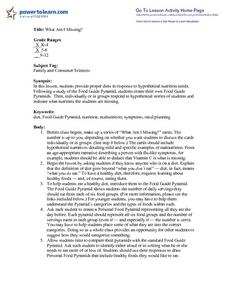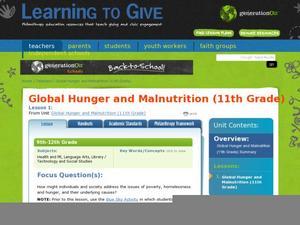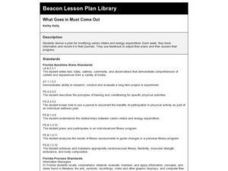Curated OER
Nutrients Nutrients We Need
Second graders examine the six nutrients humans need to maintain good heath. In this ecosystem lesson, 2nd graders learn about how plants grow and compare how humans need nutrients from plants to how plants need nutrients from the soil....
Curated OER
Nutrients
Fourth graders understand the important nutrients in food and the value of each. In this nutrients lesson, 4th graders complete a chart giving examples of foods that contain that nutrient and a definition of the nutrient. Students...
Curated OER
Benefits of Nutrients
Explore the nutrients a body needs using this resource. Learners discuss the importance of the relationships between proteins, fats, carbohydrates, vitamins, minerals, and water. It's a great way to have your class talk about the healthy...
Curated OER
4th Grade Food Safety Lesson
From a high-speed hand-washing lesson to identifying important nutrients in fruits and veggies, this resource has several activity ideas and worksheets for teaching food safety to your learners.
Curated OER
Food Pyramid
Students construct food pyramids by painting shoe boxes and using them to respresent different food groups. They cut out and paste pictures of the respresentative foods for the groups on the box sides. They compare their diets to the...
Curated OER
Nutrition
Seventh graders investigate nutrition and nutrients. In this nutrition or diet lesson plan, groups of students create a poster, commercial, or skit about a nutriet which will be presented or performed to the rest of the class...
Curated OER
The Six Nutrients Student Worksheet
In this health worksheet, students answer ten questions based around the concept of the different types of foods like carbohydrates, proteins, and fats with an emphasis upon how they are used in the body.
Curated OER
What Am I Missing?
Discuss nutrition and identify components of a healthy diet, view a Food Guide Pyramid, and create a Personal Food Pyramid, listing all foods eaten in the past 24 hours. Compare food lists with the standard Food Guide and determine where...
Curated OER
Meal Planning
Students study the nutrients found in foods and the food pyramid. In this investigative lesson students will plan a seven day menu built around the food pyramid.
Curated OER
You Are What You Eat (The 6 Main Nutrients Found in Foods)
Students study how carbohydrates, proteins, fats, vitamins, minerals and water provide basic nutrients for body growth and function. They describe quality sources of the basic nutrients and the importance of water.
CCEA
Home Economics: Teen Building
Learners explore the emotional and nutritional needs of teenagers in a six-lesson unit, which covers such topics as food sources, cooking skills, emotional well-being, and the positive effect of food and family occasions.
Baylor College
Water in Your Body
Do you know how much water you have had in the last 24 hours? Do you know how much your body needs? For this hands-on activity, your class members will estimate how much water our bodies lose each day by filling and emptying one-liter...
Curated OER
Dietary Guidelines/Food Pyramid
Students study the recommended Dietary Guidelines for Americans and the Food Guide Pyramid. They discuss the foods they eat, watch a video about the Food Pyramid and examine actual foods portioned out into recommended serving sizes.
University of Texas
What Are Calories?
What are calories, and how do calorie needs differ from person to person? Here is a worksheet that briefly explains how calories measure the energy supplied by food, as well as suggests the amount of food an individual should eat per day.
Curated OER
Building a Better Body
Fourth graders investigate the six essential nutrients. They read a handout, discuss the six nutrients, and construct a sandwich using ingredients that belong to the nutrient groups.
Curated OER
Foods and Nutrition
Students study nutrition, healthy choices for food, and ways to prepare food. They review the Food Guide Pyramid and play Nutriend Tic Tac Know to select healthy foods. As a group they make pretzels, Mystery Muffins, soda, and play the...
Curated OER
A Healthy Diet is a Balancing Act
It's important to teach kids how to have a balanced diet. They are provided with six different meals, they fill in the blanks to complete each one to make it balanced. The answers could be anything and the meals offered don't seem very...
Curated OER
Connecting School Meals to Classroom Learning
Students examine the impact of dairy nutrients. In this nutrition instructional activity, students participate in interactive activities that require them to consider how much calcium their bodies need. Students also visit the school...
Curated OER
Lesson 3: Nutrition, Labeling and Packaging
Students explore basic nutrition concepts to help them select healthy diet, evaluate food intake, discuss major food labeling issues, design labels for food products, examine history of food packaging development and how packaging...
Curated OER
Global Hunger and Malnutrition
Is there a difference between hunger and malnutrtion? Is this a problem only in third world countries? How does hunger and malnutrition affect the community? Why do these problems exist when the world produces enough food to feed...
Curated OER
Diet: Cereal Grains and Nutrition
Learners identify the nutritional value of various cereal grains. Without adding sugar, they cook with grains and compare the taste to cereal containing sugar. In addition, students complete worksheets about the different grains,...
Curated OER
Mathematics Through Nutrition
Students plan a meal including shopping, preparing and meal and serving it. They become aware of different foods from different ethnic backgrounds and describe the displays in the store and why the items are displayed as they are.
Curated OER
Diet Evaluation Project
Middle schoolers record two consecutive days of food intake. They identify which nutrients are below 70%. They compare diet composition between protein, fats, and carbohydrates. They evaluate fat in the diet to fall below the American...
Curated OER
What Goes in Must Come Out
Students monitor their calorie intake and energy expenditure. They keep track of daily data in a journal and assess and adjust their diets as appropriate.























